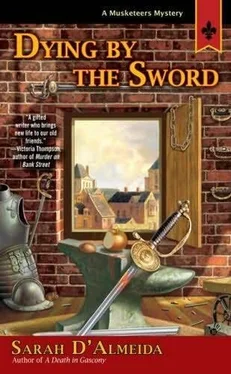Sarah D'Almeida - Dying by the Sword
Здесь есть возможность читать онлайн «Sarah D'Almeida - Dying by the Sword» весь текст электронной книги совершенно бесплатно (целиком полную версию без сокращений). В некоторых случаях можно слушать аудио, скачать через торрент в формате fb2 и присутствует краткое содержание. Жанр: Триллер, на английском языке. Описание произведения, (предисловие) а так же отзывы посетителей доступны на портале библиотеки ЛибКат.
- Название:Dying by the Sword
- Автор:
- Жанр:
- Год:неизвестен
- ISBN:нет данных
- Рейтинг книги:4 / 5. Голосов: 1
-
Избранное:Добавить в избранное
- Отзывы:
-
Ваша оценка:
- 80
- 1
- 2
- 3
- 4
- 5
Dying by the Sword: краткое содержание, описание и аннотация
Предлагаем к чтению аннотацию, описание, краткое содержание или предисловие (зависит от того, что написал сам автор книги «Dying by the Sword»). Если вы не нашли необходимую информацию о книге — напишите в комментариях, мы постараемся отыскать её.
As the Four Musketeers race to save Porthos's servant from the gallows, they run afoul of Cardinal Richelieu, who is investigating a far more serious matter – a plot against the life of the king.
Dying by the Sword — читать онлайн бесплатно полную книгу (весь текст) целиком
Ниже представлен текст книги, разбитый по страницам. Система сохранения места последней прочитанной страницы, позволяет с удобством читать онлайн бесплатно книгу «Dying by the Sword», без необходимости каждый раз заново искать на чём Вы остановились. Поставьте закладку, и сможете в любой момент перейти на страницу, на которой закончили чтение.
Интервал:
Закладка:
“Afraid? Us?” de Brisarac asked.
“Indeed. Else, why would you hope the law would rid you of us? Why else, but that you, yourselves, could not defeat us?”
De Brisarac reached for his sword, but Jussac held his arm. “No,” he said. “You do not want to answer to his eminence for that. We’ll simply arrest these miscreants, and they can tell his eminence their pretty tale.”
“It is not a pretty tale, you fool,” Porthos said. “Here. Come here.” Without ceremony, the giant musketeer grabbed Jussac by the arm and dragged him over to where he’d been fighting his enemies. “Do you see that? The ground is fairly hard, but even so you can see my footsteps and, see, two others.”
“So, you were fighting these other two and they-”
“Don’t be more foolish than you can help being,” Porthos said, and D’Artagnan had to suppress a wish to giggle, since that was a comment more often heard from Aramis to Porthos. “Look there. I wounded this man. See the blood? And before you tell me it’s D’Artagnan’s, note how the drops vanish into the shadows there. And here.” He forcibly led the guard another way. “Here, see, was where Aramis wounded his adversary. Look how he ran into the night, pouring blood out of him. Why, if the boy had bled that much, instead of simply looking white as a ghost, he would be a ghost.”
The guard made a noncommittal sound in his throat. And Porthos said, in a tone of utter, sneering disdain, “Your Cardinal is in many ways a man without honor. But he is not stupid. If you should go to him with that story, and I told him mine and showed him the evidence, I would not be the one arrested. Nor you, I dare say, since it is not a crime to be a fool. But if I know the tender mercies of the gentleman you serve, he would be furious you ignored attackers, loose in the grounds of the royal palace. And even more furious that you showed yourself for a fool. Now, I don’t know how true this may be, but I’ve heard stories of what happens to those who displease the Cardinal.”
Jussac was quiet a long time.
“Come, Jussac, you know he is right,” de Brisarac said, in a resigned tone.
“Very well,” Jussac said, in a tone that sounded more like challenge than like surrender. “We will follow your so-called attackers, but heaven help you if we find they were your accomplices.”
“How could they be our-” Porthos started.
But Aramis made a gesture to silence him. And as the guards vanished into the night, in the direction the figures had disappeared, he turned to D’Artagnan. “There, you have stopped bleeding. Now, if you can walk, we will go to Athos’s lodgings and see if we can unravel this very confusing hour.”
A Ghost Walking; A Musketeer’s Conscience; Where Athos Understands Porthos’s Difficulties
ATHOS left Rochefort’s office by way of a side door to the Palais Cardinal. He stumbled blindly past the guard there. And stopped.
Walking past him, down the darkened alley into which the door opened, was a ghost. It was a ghost he’d often seen in the dark, but never while wide awake. The ghost of the woman he’d once killed.
Tall, slim, though her heavy breasts and slim waist were disguised in a heavy cloak, Athos could tell she was indeed his late wife. Her carriage, the way she held her head, the pale blond hair that swept down to her waist-all of them belonged to Charlotte, Countess de la Fere.
Her name was on his lips. He wanted to pronounce it, to beg her pardon, to besiege her to look at him, to forgive him for having killed her. But she was so clearly there-solid, as solid as he was.
He thought, for a moment, madly, that perhaps Charlotte had had a sister-someone who looked exactly like her. But as she approached the door, without noticing him-not unbelievable, since he was wearing a musketeer’s attire and had his hat low over his eyes-she raised her hand to show the guard something. And on her hand, Athos saw a very small silver ring, with the glimmer of a pinkish stone. The ring that had once been his mother’s, the ring he had given his wife.
And the guard spoke to her, the guard answered her. He called her “milady” in English, as though she bore an English title, and she inclined her head to him as she went past.
Athos, pierced by regret, shock and confusion, remained standing where he was, long enough that the guard-a young man and, as such, brash and full of his own prerogatives and, after all, in his own territory-asked him if he needed anything more and suggested that perhaps he needed to move along.
Moving along was easy-at least physically. Athos allowed his feet to be set one in front of the other, insensibly carrying him away from the Palais Cardinal and towards his own lodgings, his mind benumbed. He’d hanged his wife. Of this he was as sure as he was sure he was alive, breathing, male, and Alexandre, Count de la Fere, now living under the penitent name of Athos. He had married the sister of his curate. She was well beneath his dignity, but so beautiful and seemingly so pure and pious that he couldn’t but fall in love with her.
A week after her elevation to the dignity, they’d been out hunting together. The countess, more eager in the chase, had spurred her horse ahead with such vigor, and charged with such intent blindness that she hit her head, hard, against the low branch of an overhanging tree, falling from her horse in the process.
Coming across his wife, to all appearances dead, the young count had panicked. With trembling hands, he’d cut her dress, to allow her to breathe more freely and perhaps recover consciousness.
They’d been married for a week. He’d enjoyed to the full the pleasures of his conjugal bed. He had not, however, seen his wife naked in the full light of day. Now, on a clearing on his lands, he saw her shoulder-and upon it, though small and very faded with cosmetics-was the brand of a criminal, the fleur-de-lis.
The shock and horror of that moment still made him reel, more than twenty years later. Branded criminals were adulterers, thieves, even murderers who had been branded between condemnation and execution, so that should they escape they would never be safe. It was the brand of infamy. [5]
Athos didn’t think-though it was hard to tell, looking back and trying to judge the feelings of that much younger man-he’d ever experienced anger. He didn’t think he’d ever moved beyond shock and throat-tightening horror. The wife whose position in life, by itself, would have caused Athos’s father to tell him he had besmirched the dignities of his life, had turned out to be yet far more unworthy and in a way that Athos couldn’t explain away by invoking her sweetness or her purity or even her beauty.
The sheer enormity of having picked, as the mother of his future children, a woman depraved enough to deserve that brand upon her shoulder had crashed about his head like a thunderstorm. He could only think of what people would say, should they ever find out. How, for the rest of his life, he would be pointed at and laughed at. How, should he ever marry again, his children too would be tainted with his dishonor, his mind-crushing miscalculation.
Unable to be angry, unable to think, he’d gotten a roll of rope that he kept in his saddle. He’d hanged his wife from a low hanging branch. He’d disposed of his affairs as though he had died. By the time evening fell, he was on his way to Paris with only Grimaud, who had once been his father’s valet and who had watched over Athos from earliest childhood.
Now, in the twilight of late winter, in Paris, twenty years after, he felt a headache forming. How can Charlotte be alive?
He’d hanged her. He remembered that. Though truth be told, he didn’t remember staying around and waiting to make sure she had indeed died. Such was his mental state at the time, that he thought he’d hanged her, then ridden away, disturbed by the last feel of her body in his arms.
Читать дальшеИнтервал:
Закладка:
Похожие книги на «Dying by the Sword»
Представляем Вашему вниманию похожие книги на «Dying by the Sword» списком для выбора. Мы отобрали схожую по названию и смыслу литературу в надежде предоставить читателям больше вариантов отыскать новые, интересные, ещё непрочитанные произведения.
Обсуждение, отзывы о книге «Dying by the Sword» и просто собственные мнения читателей. Оставьте ваши комментарии, напишите, что Вы думаете о произведении, его смысле или главных героях. Укажите что конкретно понравилось, а что нет, и почему Вы так считаете.











